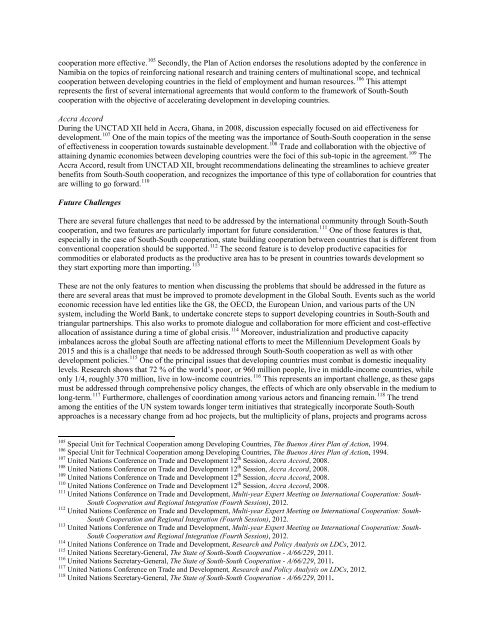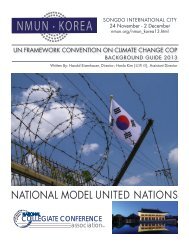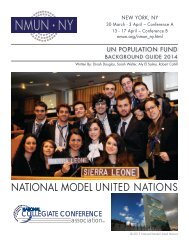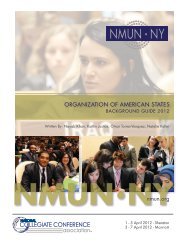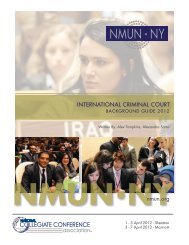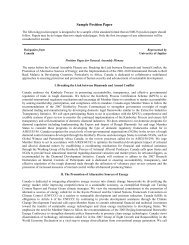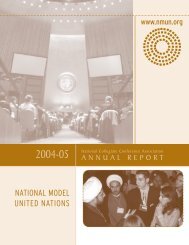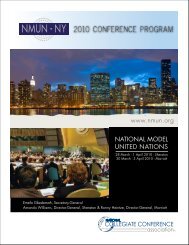UNCTAD Background Guide - National Model United Nations
UNCTAD Background Guide - National Model United Nations
UNCTAD Background Guide - National Model United Nations
You also want an ePaper? Increase the reach of your titles
YUMPU automatically turns print PDFs into web optimized ePapers that Google loves.
cooperation more effective. 105 Secondly, the Plan of Action endorses the resolutions adopted by the conference in<br />
Namibia on the topics of reinforcing national research and training centers of multinational scope, and technical<br />
cooperation between developing countries in the field of employment and human resources. 106 This attempt<br />
represents the first of several international agreements that would conform to the framework of South-South<br />
cooperation with the objective of accelerating development in developing countries.<br />
Accra Accord<br />
During the <strong>UNCTAD</strong> XII held in Accra, Ghana, in 2008, discussion especially focused on aid effectiveness for<br />
development. 107 One of the main topics of the meeting was the importance of South-South cooperation in the sense<br />
of effectiveness in cooperation towards sustainable development. 108 Trade and collaboration with the objective of<br />
attaining dynamic economies between developing countries were the foci of this sub-topic in the agreement. 109 The<br />
Accra Accord, result from <strong>UNCTAD</strong> XII, brought recommendations delineating the streamlines to achieve greater<br />
benefits from South-South cooperation, and recognizes the importance of this type of collaboration for countries that<br />
are willing to go forward. 110<br />
Future Challenges<br />
There are several future challenges that need to be addressed by the international community through South-South<br />
cooperation, and two features are particularly important for future consideration. 111 One of those features is that,<br />
especially in the case of South-South cooperation, state building cooperation between countries that is different from<br />
conventional cooperation should be supported. 112 The second feature is to develop productive capacities for<br />
commodities or elaborated products as the productive area has to be present in countries towards development so<br />
they start exporting more than importing. 113<br />
These are not the only features to mention when discussing the problems that should be addressed in the future as<br />
there are several areas that must be improved to promote development in the Global South. Events such as the world<br />
economic recession have led entities like the G8, the OECD, the European Union, and various parts of the UN<br />
system, including the World Bank, to undertake concrete steps to support developing countries in South-South and<br />
triangular partnerships. This also works to promote dialogue and collaboration for more efficient and cost-effective<br />
allocation of assistance during a time of global crisis. 114 Moreover, industrialization and productive capacity<br />
imbalances across the global South are affecting national efforts to meet the Millennium Development Goals by<br />
2015 and this is a challenge that needs to be addressed through South-South cooperation as well as with other<br />
development policies. 115 One of the principal issues that developing countries must combat is domestic inequality<br />
levels. Research shows that 72 % of the world’s poor, or 960 million people, live in middle-income countries, while<br />
only 1/4, roughly 370 million, live in low-income countries. 116 This represents an important challenge, as these gaps<br />
must be addressed through comprehensive policy changes, the effects of which are only observable in the medium to<br />
long-term. 117 Furthermore, challenges of coordination among various actors and financing remain. 118 The trend<br />
among the entities of the UN system towards longer term initiatives that strategically incorporate South-South<br />
approaches is a necessary change from ad hoc projects, but the multiplicity of plans, projects and programs across<br />
105 Special Unit for Technical Cooperation among Developing Countries, The Buenos Aires Plan of Action, 1994.<br />
106 Special Unit for Technical Cooperation among Developing Countries, The Buenos Aires Plan of Action, 1994.<br />
107 <strong>United</strong> <strong>Nations</strong> Conference on Trade and Development 12 th Session, Accra Accord, 2008.<br />
108 <strong>United</strong> <strong>Nations</strong> Conference on Trade and Development 12 th Session, Accra Accord, 2008.<br />
109 <strong>United</strong> <strong>Nations</strong> Conference on Trade and Development 12 th Session, Accra Accord, 2008.<br />
110 <strong>United</strong> <strong>Nations</strong> Conference on Trade and Development 12 th Session, Accra Accord, 2008.<br />
111 <strong>United</strong> <strong>Nations</strong> Conference on Trade and Development, Multi-year Expert Meeting on International Cooperation: South-<br />
South Cooperation and Regional Integration (Fourth Session), 2012.<br />
112 <strong>United</strong> <strong>Nations</strong> Conference on Trade and Development, Multi-year Expert Meeting on International Cooperation: South-<br />
South Cooperation and Regional Integration (Fourth Session), 2012.<br />
113 <strong>United</strong> <strong>Nations</strong> Conference on Trade and Development, Multi-year Expert Meeting on International Cooperation: South-<br />
South Cooperation and Regional Integration (Fourth Session), 2012.<br />
114 <strong>United</strong> <strong>Nations</strong> Conference on Trade and Development, Research and Policy Analysis on LDCs, 2012.<br />
115 <strong>United</strong> <strong>Nations</strong> Secretary-General, The State of South-South Cooperation - A/66/229, 2011.<br />
116 <strong>United</strong> <strong>Nations</strong> Secretary-General, The State of South-South Cooperation - A/66/229, 2011.<br />
117 <strong>United</strong> <strong>Nations</strong> Conference on Trade and Development, Research and Policy Analysis on LDCs, 2012.<br />
118 <strong>United</strong> <strong>Nations</strong> Secretary-General, The State of South-South Cooperation - A/66/229, 2011.


